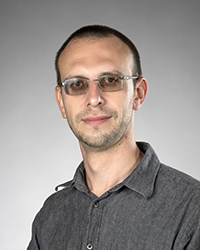
In a world where technology can connect colleagues across institutions, cities, and continents, Alexander Shapiro knows that it is not just the credentials of individuals but also the sense of community that matters on university campuses. That is why this fall, he is excited to join the Notre Dame Department of Mathematics as an assistant professor, where he will work with previous collaborators and new associates, too.
In his research, Shapiro investigates the mathematical questions brought up by new ideas in physics, such as quantum mechanics and quantum field theory. His work involves disciplines as diverse as representation theory, quantum groups, integrable systems, cluster algebra, and combinatorics. Shapiro appreciates how this research allows him to engage his academic curiosity.
“For me, it’s most interesting because it just combines methods and problems from several different areas of mathematics, and you always have an excuse to read [articles] and educate yourself,” he said.
Shapiro’s higher education began with his master’s of science at Moscow State University and his doctoral degree in mathematics at the University of California, Berkeley. He then worked as a postdoctoral fellow, teaching and doing research at the University of Toronto and the University of Edinburgh, before returning to UC Berkeley again.
As Shapiro progressed in his studies, his focus on the intersection of mathematics and physics brought him closer to the work of his father, a fellow mathematician. He began to collaborate with Michael Gekhtman, a professor in Notre Dame’s Department of Mathematics who published papers with Shapiro’s father. Because of this relationship, Shapiro has actually known Gekhtman since the age of six or seven, but he is excited to now work with him as a colleague at Notre Dame.
In addition to strengthening this previous connection, Shapiro will help mentor a new generation of mathematicians on campus this year.
“I’m actually looking forward to having postdocs and graduate students of my own, because I think at this moment I have quite a lot of problems that I would be happy to share and [that I] can delegate,” Shapiro explained. “It would be fantastic to have a crowd around me, working on the same thing.”
Shapiro is teaching an undergraduate calculus class this semester, too, and he feels impressed by students’ kindness, professionalism, and attention to detail. In the future, he hopes to expand the scope of his instruction to include graduate courses in representation theory, quantum groups, and integrable systems. But in addition to this highly specialized subject matter, Shapiro would also like to teach an introductory course for students who know very little about math at all, highlighting why “mathematics is beautiful.”
Whether he works with fellow professors, graduate students, or undergraduates, Shapiro feels grateful for the connections he can make at the Notre Dame Department of Mathematics.
“It’s one of the very strong departments in the country and in the world, but also it’s definitely one of the, if not the, nicest departments just in terms of relationships between people,” Shapiro explained. “It’s actually really nice to be a part of this crowd, part of this department on a personal level… at the moment I’m just happy to grow in this place.”